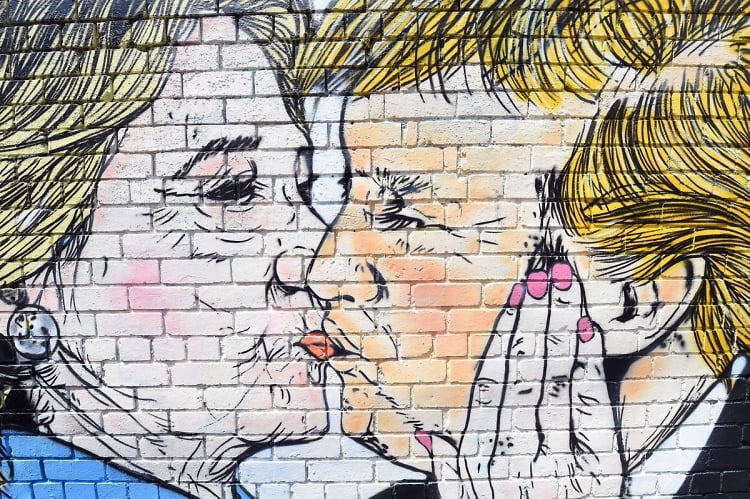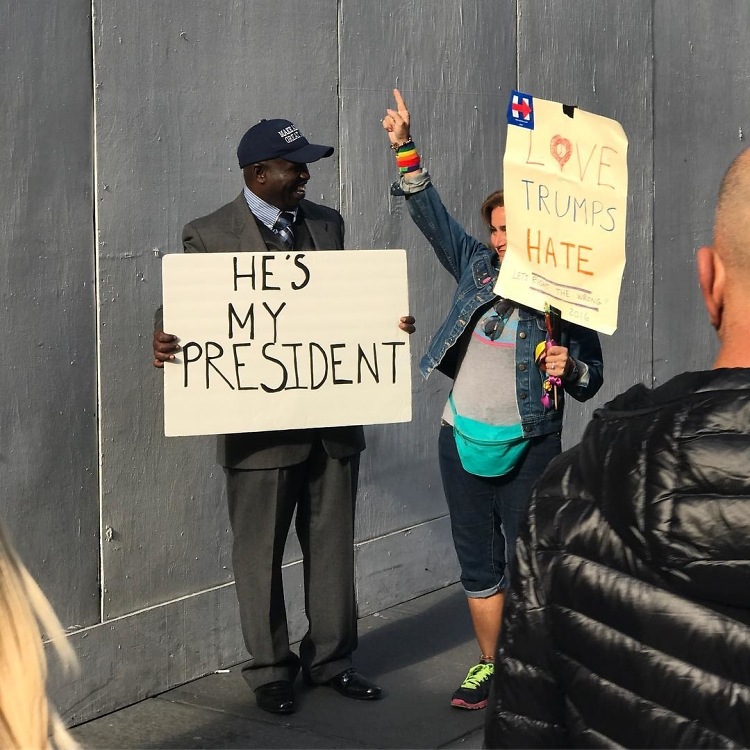
Being single in New York usually means that you subscribe to the polite rules of dating, i.e. no talking politics, religion, or yearly income too early on. But when that last one can go so easily unsaid (and not-so-easily ignored), why should the other two topics be so off limits? Your date works in finance, lives in Tribeca sans roommates, and sprung for the $500 bottle of wine. They're not shy about their black card, so why be shy about your politics?
I'll admit, avoiding the danger zone of first date topics is always hard for me, more so after my second cocktail, but in the past year, it's felt as if those were the only things to talk about. I mean, can't two consenting adults address current events without the conversation colliding with your potential for romance? Um, maybe. But more and more it seems, maybe not.
Dating is hard in general, but dating during an election year can feel impossible, especially if you're particularly outspoken about issues that directly affect your way of life. Things you won't budge on. Things you couldn't possibly argue from the other side even if you were back in high school and had to play devil's advocate for debate class or something. My reasoning? It's better to find out early on if your fundamental views butt heads, that way you can shift your focus. Sure, I'd sleep with this conservative (considering he doesn't think condoms are a sin), but I would really never want to meet his parents. On the other hand, if our politics align, so too do our stars. #YouCanPutARingOnItButMarriageIsAPatriarchalConstructAndILoveThatYouGetThat.
To put it into perspective, nobody is safe. While I'll acknowledge my place firmly within the oft-referenced "liberal bubble" of Manhattan and Williamsburg, there are (shocker!) still plenty of funny, sweet, and handsome men within this bubble who shift uncomfortably when I declare, proudly, that I'm a feminist. "But I shave my armpits!" I follow up with a try-laugh in an attempt to make them feel better. (Note: I'm realizing now that I should not have to say that.) Hell, I joked with a Canadian I was seeing a few months ago about how glad I was not to be on a date with someone who could vote in this election. He proved very quickly that Canadians do, in fact, have their own opinions on American politics.

But, maybe I'm too harsh. Maybe I've been single and living in the comfortable confines of my own ideas for too long. So I posed the question to a few of my peers: Are politics a dating deal-breaker? Within my mostly liberal office, it appears to boil down to individual issues. JR, our Chief Tech Engineer, is married and said it was less about party alignment and more about where he and his wife both stand on some things. (He also helpfully pointed me towards the notoriously opposite political pundits James Carville and Mary Matalin, who also happen to be husband and wife. If they can make it for decades...) Mackenzie, our Events Manager, said her personal view of her date would change if she found out they had substantially different opinions on some issues, while Christie, our Special Projects Editor, responded to my prompt in a very Christie fashion: "Your political beliefs should never be a secret. Something you feel shy with sharing. Two lefts don't make a right, and you keep making enough lefts, you'll probably fall right off a cliff. If you're not changing your thoughts over time, developing your mind, editing and editing and editing - what a bore you must be."
In my mind, politics, like religion, should generally take a backseat during so casual a courting ritual as a first date, but the closer you get to thinking, "I may actually want to procreate with this person," the more you should consider these differences. Then again, if Chrismukkah exists, why can't a republicrat?
For some, dissenting views are not a problem as long as the person, for lack of a better phrase, knows their shit. My Economist-devouring friend Giuseppe loves a good debate (I should know) and thinks "the only time politics aren't an issue is when civil liberties aren't up for discussion and the math adds up. If I'm not hearing a sound response with logic and facts, I can't keep seeing the person without seeing them as a complete idiot." OK, fair enough.
For many, though, there was a fundamental difference with this election cycle. It wasn't just "politics as usual," but something much, much deeper. (Non-political) party circuit pro Michael Tommasiello told me, "I think normally politics aren't a deal-breaker because people are allowed to have a dissenting opinion that's framed by their worldview. However, this recent election wasn't a question of republican vs. democrat policies, but on discrimination and hate vs. not."
A fellow writer, Celine B., maintains "agree to disagree is without question a rule of thumb in relationships. I try to practice this often, though in my opinion, it's harder to embrace as a woman in a time of political strife." What she points out is something a bit more subtle, but no less undermining; if you're a woman and you've been asked whether or not you "voted with your vagina" this November, chances are you can relate.
"The perception of women is that we are innately weaker than our male counterparts, thus easier to prey upon, even by those who care for us and who would never do so consciously. I am extremely independent, and can confidently say that this past election, if anything, has put one's ability to think independently to the test. It has made way for the constant clouding of thought and emotion, especially when we as women are constantly made to feel as if we are overreacting or are required to justify our anger by people on social media or in discussion/debate amongst friends, strangers, or a significant other. It sucks when you're made to feel this way by the latter; to have someone so close to you challenge your instincts and motives, intentionally or not."
This time around, "political" rhetoric resulted in some very real consequences, and very real fear, for people of color, ones that could no doubt have an effect on their relationships. Valerie G., who is based in what plenty would consider the liberal haven of San Francisco, is dating a man who moved here from India four years ago. "He held me as I ugly cried during Hillary’s concession speech. We come from very different backgrounds, but work well together because we believe in the same basic things, like everyone should be treated equally. I don’t think I could ever date a conservative or republican because we wouldn’t agree on the essentials."
But the friction they face comes as an outside force, even in easy breezy California. "There are definitely things I’m more aware of since dating him. Like beard prejudice. I love his big Indian beard. It’s sexy as fuck and I whine every time he shaves it, but one reason he shaves it is because he doesn’t want to be 'randomly checked' by airport security because being brown and having a beard apparently makes you look like a terrorist. Which fucking sucks. Politics and fear are literally killing my boner."
Then, of course, there's the uncomfortable truth. Valerie continued, "The other thing I think about is if we have kids. I’m super white and our kids would be brown, which means they would get treated differently than my brother and I were when we grew up. I would have to have conversations with them that my parents never had with me and worry about them more than if I had two little blond heathens. I hope that whatever color my kids are or however they identify, politics won’t get in the way of them feeling safe in the US, but as it currently stands, that’s not the reality."
The things at stake during this election also worked to bridge a bipartisan gap. Timothy F., a young, center-right republican is dating a fairly liberal democrat. According to him, "This election was actually relatively tension-free, since we saw eye-to-eye on Trump. It might have been a bit rougher if Rubio or Kasich was the Republican nominee, or if Bernie was the Democrat...Neither of us went to bed happy last Tuesday. I've recovered much quicker though, since I at least can hope Trump chooses to govern like a regular Republican. I'm usually the one who points out all the reasons trump won't end the Republic, although I have put some thought into what I'd do if my concerns about him were right. She's been thinking about how to be part of the loyal opposition, and is already planning to volunteer for groups opposed to the actual or perceived Trump agenda."
Then again, the role of political talk in your relationship really depends on the people in it. Perhaps you're a happy bystander, perhaps you both are. But if it plays a major part in both of your lives, agreeing on the big things seems to make it easier. Josh A., who has been with his girlfriend for over two years, says, "Our politics are pretty closely aligned. We both voted Bernie in the primary and Clinton in the general. We watched most of the primary and general election debates together, and we discuss politics all the time. I think if we didn't agree on so many issues, we never would've gotten this far. We broached politics early on and with great trepidation, and were extremely relieved to find ourselves on the same page. To both of us, political stances on social issues were potential deal breakers."
Like every aspect of a healthy relationship, though, what it comes down to is communication. Think independently, like Celine said, but don't be afraid to open up the floor. On talking to his girlfriend, Timothy told me, "the arguments she used to get me to vote for Hil were a bit different than the ones used for most undecided millennials. She ended up becoming the only Hillary supporter to ever say 'you have GOT to read these emails on Wikileaks.'"
The same idea can be applied if you're still operating in the realm of singledom and then it's probably more important than ever. Talk about it early on and never be scared to stick to your guns. Whether you like each other enough to cross party lines, well that's just up to you.
[Photo via Twitter @jefecampana]


.jpg)
.jpg)



.jpg)
.jpg)
.jpg)


.jpg)
.jpg)
.jpg)